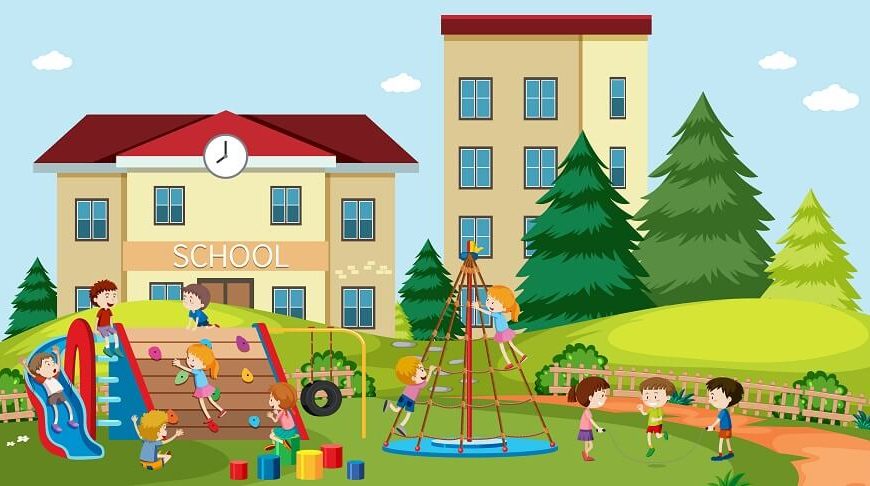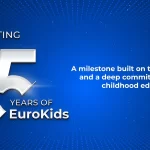Amidst high screen time and the hectic schedules of parents, the world is missing out on the benefits of childhood exercise. While we all know physical exercise is important for kids, it is very challenging for young parents to pull their kids from the virtual world of cartoons and video games to the real world of exercise. To make your little ones interested in childhood exercise, it is essential that they understand the importance of fitness. The importance of exercise in early childhood can be reflected by the healthy physical and mental state of the child, focused approach, activeness, and other growth and development enhancements.
Regular childhood exercise is essential for the healthy development of your little one. From the earliest of ages, physical activity helps develop strong bones, muscles and even shapes the way that children learn.
Apart from the obvious benefits of exercise, the importance of fitness can also be seen in the way exercise encourages coordination and teaches kids about their body moves. It also promotes social interaction and teamwork as kids come together to reach a common goal. Being active increases confidence in children and helps them develop healthy habits that go a long way in their life. Studies have shown that the importance of exercise includes improved concentration, higher self-esteem, better sleeping patterns, stronger problem-solving skills, and improved academic performance.
In this article, we will explore why promoting childhood exercise routines is such an important part of a kid’s development, what types of activities are best for young children, and how parents can help encourage their kids to stay active.
Understanding the Physical Excersie Benefits in Kids
Childhood exercise is essential not only for physical growth but also for mental growth during the early stages of childhood. Participating in childhood exercise regimes helps young people to develop motor skills, coordination, balance, strength, and flexibility. All of these are important assets for leading healthy and active lives into adulthood. Physical activity has also been proven to have direct positive impacts on cognitive development in children – stating the importance of fitness. Studies show that it can improve problem-solving skills, enhance academic performance, increase concentration levels, and build self-esteem.
Additionally, childhood exercise can help kids to build emotional resilience by allowing them to practice controlling their emotions during challenging activities.
The importance of fitness for kids also contributes to the development of good social habits early in life. By playing with peers in a variety of settings, children can learn how to develop interpersonal relationships and collaborate on tasks with their peers. This leads to improved communication skills which are key components of success for most adult endeavors.
Mental Health Benefits of Physical Activity
Childhood exercise isn’t just great for physical health—it also has wide-reaching mental and emotional benefits for kids. Studies have found that regular childhood exercise can help children develop better learning habits and improved focus, both of which are important for success in school and in life – suggesting the importance of exercise. Exercise helps deliver oxygen to the brain, increasing alertness, productivity, and better concentration.
Childhood exercise also has the potential to improve a child’s mood, reduce anxiety, and enhance their overall lifestyle. Along with direct mental health benefits like reducing stress and feelings of depression, exercise also promotes self-esteem and provides kids with a sense of accomplishment. These effects can last long after the exercise session is over, leading to increased happiness and well-being. Physical activity supports the outlet of pent-up energy while also providing them with an opportunity to express themselves socially. The importance of exercise or group activities is that kids can learn significant social skills such as teamwork, communication, problem-solving, empathy, and respect—all while having fun!
Social and Emotional Benefits
The importance of fitness not only promotes increased activity among children but their emotional and social well-being also reap the rewards. Physical exercises importance in kids includes developing self-confidence, social skills, and the capacity to regulate behavior.
Many studies have shown that children who engage in regular physical activity are at a reduced risk for anxiety and depression. By participating in physical activities, such as team sports, kids learn valuable lessons about collaboration and taking on leadership roles. Such skills can carry over into other areas of life, such as the classroom, where they may be more likely to work together with classmates to solve problems or come up with creative solutions than their less active counterparts.
Playing games outdoors helps children connect with others in their community, as well as nature itself – something incredibly important for cultivating care for our planet. Improving a child’s mental well-being can also lead to better academic results, as kids feel more confident taking on new challenges that require thinking outside the box.
Inclusivity When Planning Physical Activities for Kids
Knowing about physical exercise importance in kids’ life should be the top priority. Your little ones should feel like they can take part and feel comfortable doing so. Especially the children who might face physical disabilities or health issues; making sure there are adaptive options available to them will help ensure that they feel included and gain the same energy as their fellow mates.
Creating an inclusive environment also means providing a range of activities and spaces that all children can access. This could include a playground for accessible play outfitted with ramps and handrails or a running track that is wide enough to accommodate larger groups of kids. Additionally, each activity should be age-appropriate, taking into account the varying skill levels within different age groups.
There are also smaller things to consider when planning physical activities for children. Providing enough water stations and healthy snacks throughout a session, along with comfortable clothing choices tailored for all temperatures, can go a long way in making kids feel welcome. Ultimately, when planning physical activities for kids, leaders should ensure there are activities available to suit every child’s needs and interests so that everyone feels included, safe, and supported while they exercise.
Conclusion
Childhood exercise is essential for a number of reasons. It helps to keep children healthy and active, can boost cognitive performance and self-confidence, and even helps to reduce the risk of chronic illnesses in adulthood. Exercise can help to improve physical coordination, strengthen the heart and lungs, and build strong bones, muscles, and joints. Perhaps most importantly, regular physical activity encourages children to stay active into adulthood, potentially leading to a healthier life overall.
With all these benefits in mind, parents should make sure their children get enough exercise every day. Eurokids preschool offers a varied range of activities for children. From playing outside or engaging in organized sports activities to taking part in more structured exercises such as plates or yoga – there are plenty of options available. Ensuring your child gets enough exercise can be beneficial not only now but well into the future.
Contact us today or visit the nearest Eurokids center to learn more about our programs and curriculum.

















